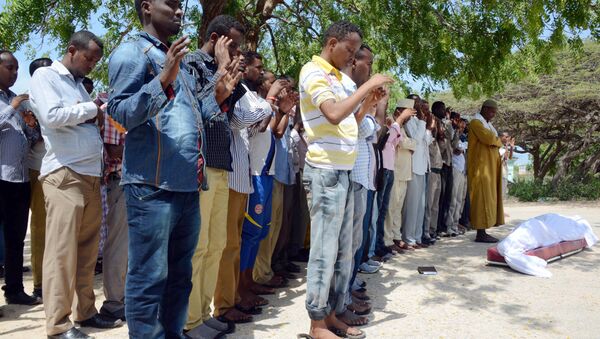"I could hear several voices telling the shooter to aim better. I could hear them saying, 'He is still alive!' "
“Caught btw Al-Shabab guns and govts’ jails,” media under attack in #Somalia, @HRW report https://t.co/vDPUi2j7LG pic.twitter.com/VkkkYRk3wf
— Felix Horne (@FelixHorne1) 3 May 2016
The quote was taken from the HRW report, titled 'Somalia: Journalists Under Attack' produced Tuesday (May 3) in aid of World Press Freedom Day. The journalist quoted was wounded so seriously that he can no longer work as a reporter.
Freedom of expression is a human right, not a crime. World Press Freedom Day #wpfd2016 https://t.co/IbIsWEZW4o pic.twitter.com/K4wGQ4HHmk
— AmnestyInternational (@amnesty) May 3, 2016
HRW investigated the number of journalists who have been killed at the hands of the government as well as terrorist organization, Al Shabab, since 2014.
After interviewing 50 journalist, editors and media directors working across the country, HRW discovered that 10 journalists have been killed, four — in targeted attacks.
New @hrw report on killings, threats & arbitrary detention of journalists in Somalia https://t.co/nX6AnVpJK9 pic.twitter.com/drjDyBOnOt
— Elaine Pearson (@PearsonElaine) May 3, 2016
HRW also discovered that six had survived assassination attempts, others had been detained, received threatening phone calls and sent text messages warning them to change their reporting or face the consequences.
In an interview with HRW, researcher Laetitia Bader, said these killings are not just a threat to Somali media coverage but also mean that young journalists' lives are constantly at risk if they do not report "favorable" news.
"News is important in Somalia. Somalis are ardent consumers of news and like to listen [to it] and discuss it. As a result journalists on the ground who report on news issues, and we are not even talking about investigative journalism, just basic coverage, face serious threats, not just from the Islamist armed group, but also the new regional administrations as well as national federal government. All sides are trying to silence them," Laetitia Bader said.
For Somalia, the media is an important resource to the people as well as those in power.
"The media is important to the people, so the government want to use the media to put forward a positive message about themselves. We are talking about anyone looking to stay in power," Bader said.
HRW investigations revealed that the risk of writing and reporting on issues in Somalia are huge. These young, fresh reporters are putting their lives in danger for a story they may not be paid for.
"I like my profession and I will not give up working for my people." #WPFDay2016 #Somalia pic.twitter.com/2qXyNvsf5e
— AMISOM (@amisomsomalia) May 3, 2016
"What we have seen recently is four targeted killings and only one of these has been investigated. The problem is the way prosecutions are happening, the intelligence agency does their investigations in a worrying manner and these cases appear before the military court where we have documented a whole range of serious violations such as limited access to lawyers, questionable evidence, and speedy processes.
"Defendants in recent cases have also subsequently been executed."
The number of news outlets who have reported on issues and ended up getting into trouble with the government is also increasing.
On #WPFD2016, recognise importance of #press freedom and safety in #Somalia. Especially in conflict situation & run up to elections.
— Harriet Mathews (@HarrietLMathews) May 3, 2016
"There are dozens of radio stations on the ground and the reality of those working on the ground is that they have to make sure that when they report on issues it will not get them into trouble. What is alarming is that journalists told us, on issues that are controversial such as elections, they often have to cut stories as they get threatening messages from authorities," Bader said.




